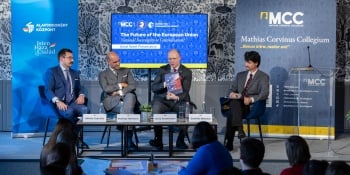Published: 11.04.2025

• Representatives of Ordo Iuris took part in the second round of consultations ahead of the 58th Session of the UN Commission on Population and Development (CPD58) on global health policy.
• The event debated a draft resolution for the final session, focusing on health across the life cycle.
• The Ordo Iuris delegation stressed the need to support maternity protection systems, access to gynecological care, and pregnancy assistance programs.
• International experts, including representatives of C-Fam and the World Youth Alliance, pointed out the dangers of redefining international law.
• They highlighted the healthcare funding crisis and the need to invest in maternity and prenatal care.
Global Health Planning
The UN Commission on Population and Development (CPD) is one of the main bodies dealing with demographic issues, health, and social policies. It was established in 1946 as a subsidiary body of the UN Economic and Social Council (ECOSOC). Its task is to monitor global demographic trends and their impact on social development, and to make recommendations for international policy.
This year’s 58th Session of the CPD, scheduled for April 2025, focuses on the issue of health across the life cycle. Accordingly, a second round of consultations was held on March 26 to gather NGOs’ views on the draft CPD Final Resolution58. The document will set the priorities for global health policy, and its provisions—while not directly binding—may influence national regulations.
Ordo Iuris experts and other representatives of pro-family circles took an active part in the consultations, stressing the need to protect the right to life, the sovereignty of states, and support for families and mothers.
Abortion Is Not a Human Right
An important voice in the debate was Stefano Gennarini, an expert representing the organization C-Fam (Center for Family and Human Rights), which has for years advocated for the protection of life and national sovereignty at the UN. Gennarini pointed out that some organizations are trying to push for a redefinition of international law by including abortion in the catalog of human rights.
“In 1994, at the Cairo International Conference, the international community made it clear that no state is obliged to legalize abortion or recognize it as a human right,” Gennarini recalled.
He stressed that this consensus is now being challenged.
“Population policies are a very sensitive area involving issues that are considered exclusively a matter to be addressed by sovereign states like migration, sexual and reproductive health, family formation. (…) So, the importance of sovereignty in such areas cannot be understated without jeopardizing consensus. (…) Today, attempts are being made to change this established order, seeking to impose an ideological agenda on developing countries. We see pressure on governments to recognize abortion as part of health care, which has no basis in international law or the Cairo Agreements,” he noted.
The expert also emphasized that instead of promoting abortion, international organizations should focus on improving health conditions for mothers and children.
“Instead of forcing countries to adopt solutions that are contrary to their culture and legal traditions, we should focus on real health problems, such as access to prenatal care, treatment of infertility or the fight against infectious diseases. These are priorities that will genuinely improve the quality of life of millions of people,” Gennarini pointed out.
Health Policy and Family Protection
Rokaia Elhommosani of the World Youth Alliance noted the key role of the family in health policy. She recalled that the CPD58 outcome document should take into account the importance of families as the primary support environment for both physical and mental health.
“The family is the basic unit of society and should be strengthened, which is a key principle of the ICPD program of action,” she stressed.
The expert argued that such policies are short-sighted and fail to address real social needs.
Representatives of the Ordo Iuris Institute also spoke during the consultation, highlighting critical issues related to the financing of health care systems.
“Instead of investing in the promotion of so-called reproductive and sexual rights, including abortion, the international community should support maternity protection systems, access to gynecological care, and assistance programs for pregnant women. These are real needs that require urgent action,” stressed Julia Ksiazek of the Ordo Iuris Institute’s Center for International Law.
Sandra Castaneda of the Latin America and Caribbean Women’s Health Network pointed out that the lack of resources primarily affects access to prenatal care and diagnostics, leading to increased maternal mortality and deteriorating population health.
Marianne Hasselgrave of the Commonwealth Medical Trust, in turn, highlighted the importance of strengthening health systems, especially in developing countries.
“We must not go backwards in implementing the ICPD, but we must also take into account new challenges, such as the growing number of cancers, including cervical cancer, which can be prevented by vaccination. (…) We need to take into account the problem of lack of access to basic medicines, vaccines and medical supplies which particularly threatens women's health,” she pointed out.
An Attack on the Protection of Life
Representatives of organizations promoting radical gender and pro-abortion demands also spoke at the consultation. They demanded that abortion be recognized as part of universal health care, arguing that this is crucial to guaranteeing so-called reproductive and sexual rights. Risu Dakan of the Asian Pacific Resource and Research Center for Women (ARO) called for the recognition of access to broadly defined "sexual and reproductive health services" (understood as including abortion) as part of universal health care, including for youth and adolescents. She stressed the need to provide sex education and to include people with diverse "gender identities" and "sexual orientations" in health policies.
Similar demands were made by Rebecca Reisdorf of the Fòs Feminista organization. She emphasized the need to strengthen references to so-called reproductive rights and sex education in the CPD’s final documents. She argued that the debate must not regress in the face of previously adopted commitments and added that, in her view, the current draft resolution does not provide sufficient guarantees.
Ordo Iuris Speaking in Favor of Life and Family
Ordo Iuris experts noted on their part that state sovereignty, the protection of the right to life, and support for families must remain priorities of global health policy.
“Instead of investing in the promotion of so-called reproductive and sexual rights, including abortion, the international community should support maternity protection systems, access to gynecological care and assistance programs for pregnant women. These are real needs that require urgent action. The protection of human dignity, the family, and motherhood must be the foundation of any international document on health and well-being. The family is the basic cell of society and should be strengthened, not weakened. Women should be supported in their role as mothers, not encouraged to see it as an obstacle,” Julia Książek stressed, adding: “We call for an approach that respects national sovereignty, cultural diversity, and fundamental human rights, recognizing the family as the foundation of a strong and healthy society.”
Together with international allies, Poland’s Ordo Iuris Institute will continue to monitor the work of the UN Commission on Population and Development, ensuring that the voice of the pro-life, pro-family community is heard, while also keeping the public informed of further developments.

• The pressure on the European Union’s southern borders has continued unabated since the great migration crisis of 2015.

17.04.2025
• The Ordo Iuris Institute has prepared an opinion for the UN as part of a thematic report on surrogacy and its impact on the rights of women and children.


• The European Union’s Council Conclusions on EU Priorities in UN Human Rights Fora in 2025 identify key areas of EU human rights activities at UN fora and refers to several universal human rights, such as freedom from torture and freedom of religion or belief.